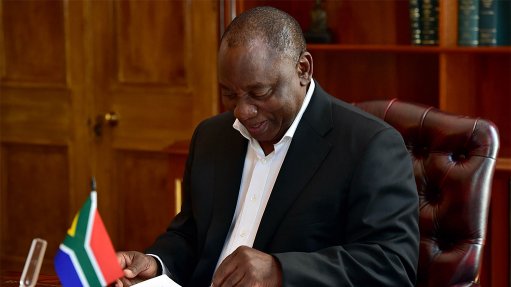
President Cyril Ramaphosa
This is the third note on happiness and Mr Ramaphosa’s presidency.
Prof Talita Greyling and Dr Stephanié Rossouw developed the “Gross National Happiness Index (GNH)” of South Africa” based on sentiment analysis of the daily Tweets of South Africans, from which they derive a happiness score. The scale of the happiness scores is between 1 and 10, with 5 being neutral, thus neither happy nor unhappy.
They have been following the political events in South Africa, since a week before the elections, and found that the happiness index is very closely related to political events. Interestingly, they also found that GNH is correlated to economic indicators such as the All-Share Index of the JSE and ALSI40, and seems to be a leading indicator.
On Thursday 20 June President Ramaphosa delivered his first State of the Nation’s address since being democratically elected on 8 May 2019. In his address, President Ramaphosa did not shy away from the real issues confronting South Africa, promising to focus on the deep structural problems. He stated that his government would provide a platform to increase business activity, which will allow for job creation. In saying that, South Africans did not enthusiastically accept president Ramaphosa's address. Many called it a “wish list” and said that President’s address was “high on dreams but low on details” and we all know that the devil is in the details…..
Thursday’s happiness followed the same pattern as all preceding Thursday’s, with highs being reached between 5:00 – 7:00 am. The rest of the day’s happiness scores fluctuated between 6 and 6.6; however, on an ordinary Thursday evening, the happiness score generally stays above 5.89 for the hours between 20:00 and 21:00. This was not the case on SONA Thursday. This Thursday was different from the others, in that instead of the mood levelling off between these hours, it decreased after 20:00 pm to lows of 5.72, (see the graph below) and the happiness score remained lower, generally than on any other Thursday night until 23:00 pm. This reflects the sceptical mood of South Africans after hearing President Ramaphosa’s wish list, which many feels will not realise. Analysing the Tweets clearly, show that the country feels as if the President was ‘selling them dreams’ and that he was too ambitious in his plans. On Friday, we saw a somewhat more positive attitude, than on Thursday evening, with the happiness score increasing and reaching an average of 6.6, in line with previous Fridays.
Now that President Ramaphosa has delivered his first State of the Nation’s address, South Africans have gone from being ‘cautiously optimistic’ about what their future entails to ‘rather sceptical’. As we follow President Ramaphosa during his time in office, the GNH will very quickly show us how the mood of South Africans change when he starts to implement policy to make these dreams a reality for all.
Issued by Prof Talita Greyling and Dr Stephanié Rossouw from UJ